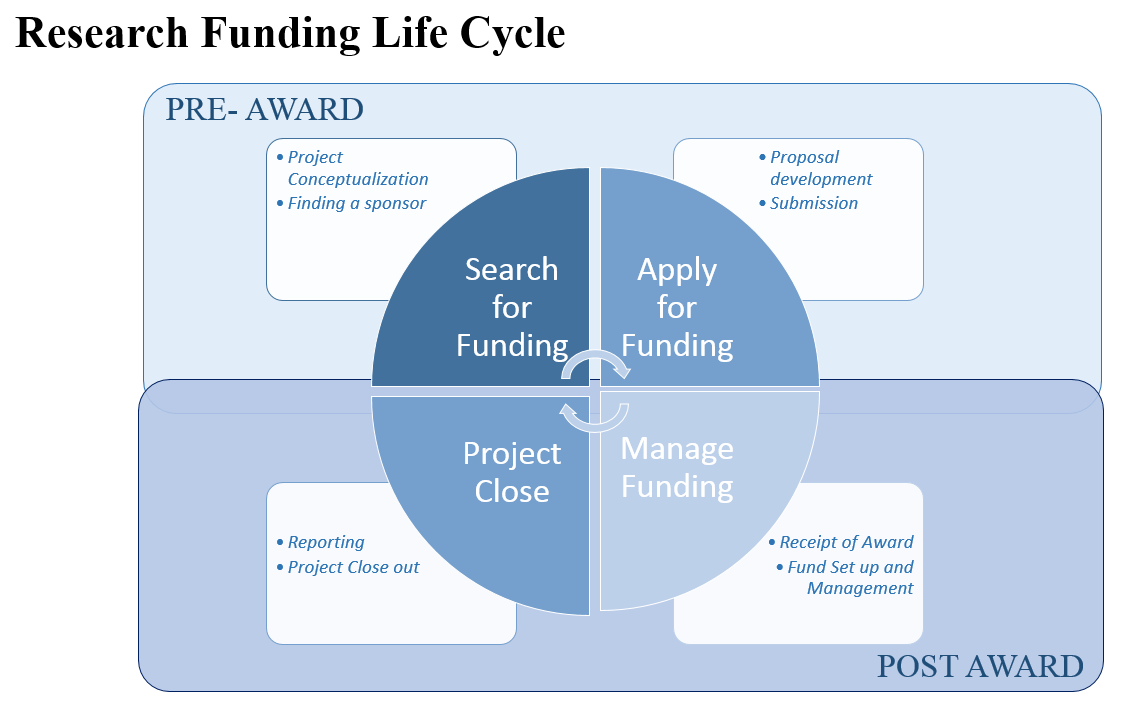Understanding the research funding life cycle gives you the necessary framework to successfully fund and carry out a research project, whether you are the Principal Investigator (PI), a member of the research team, or in any other research-fund related role.
Please note, however, that details of the life cycle can vary depending on the funder and specific research project.

The life cycle of a research fund is divided into two phases.
- Pre-Award: This phase includes all activities prior to the receipt of award, from the birth of an idea, identifying the potential funder, writing a funding proposal, and submitting the application to the funder
- Post-Award: This phase includes all activities from the receipt of award or research agreement, including conducting the research and spending the award, reporting to the sponsor, and project completion
More information on each phase can be found below.
The pre-award phase consists of the following four stages.
1. Project Conceptualization
This is the initial stage of the life cycle where an idea is formed or a research project is formulated. Before embarking on a research project, the individual must ensure that they understand who can be a Principal Investigator (PI) at the University of Toronto (U of T).
It is also important for the individual to know the roles and responsibility of a PI as indicated in the Research Administration Policy.
2. Find a Research Funder
In this stage, the PI searches for an agency or a private industry/corporation who will fund the research, often referred to as the research sponsor. In order to find a potential funder, the PI needs to identify research categories that would match their research. Then, the PI can find sponsors who fund that type of research.
See Funding Opportunities to learn more about finding a research sponsor.
3. Proposal Development
The PI writes the research proposal, which describes the objective of the research and the required budget. The following resources provide information on completing a proposal and developing a budget.
4. Submission
Once the research proposal has been written, the PI completes an online research funding application on My Research Application (MRA). Through MRA, the application will undergo internal review to obtain the university’s endorsement.
After obtaining university endorsement, the PI is expected to submit their application to the research sponsor. In some cases, U of T will submit the application on behalf of the PI.
The post-award phase consists of the following four stages.
1. Receipt of Award or Award Notification
In this stage, the PI will receive the notice of award from the Sponsor for successful applicants. Research agreements are finalized and signed by the U of T representative and the Sponsor.
2. Fund Set Up and Management
The Research Services Office (RSO) or Innovations & Partnerships Office (IPO) sets up a research fund account for the ongoing management of the project finances and Sponsor reporting requirements. Once the account has been created, budgets are set up and project funds can be spent.
The following resources provide information on accessing and spending a research fund.
3. Reporting to the Sponsor
To ensure that the research objectives are met, the sponsor generally requires submission of a progress report and a financial report. Please note that the frequency of reporting varies by the sponsor and additional reports may also be required.
The PI is responsible for the completion and submission of the progress report. Research accounting, part of the Research Oversight and Compliance Office (ROCO), then completes and submits the financial report.
Read more on the financial reporting to sponsors.
4. Project Close
In the final state of the life cycle, the progress and financial reports are reconciled and submitted to the sponsor. If an audit is required, it is common that the sponsor will request and conduct the audit at this stage.
- Guide the PI and research administrators through the research project life cycle by providing necessary resources and advice, including liaising with the Sponsor
- Provide system tools and training to facilitate research application, monitoring and administration of research awards
Find the appropriate VPRI staff member to assist you by checking our staff directory.




